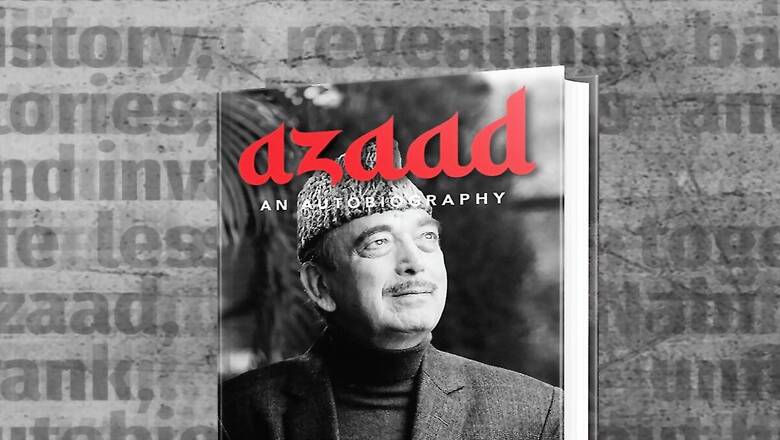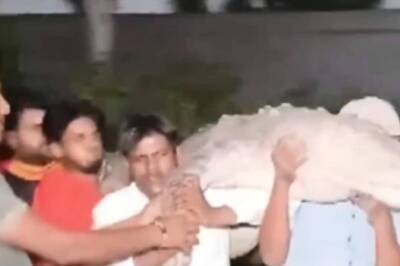
views
Veteran politician Ghulam Nabi Azad’s recently released autobiography titled ‘Azaad’ goes much beyond targeting Rahul Gandhi. The former Congress leader ingeniously attempts to show Indira and Sonia Gandhi, too, in a rather poor light while sprinkling praise upon them in generalisations. While the politician-turned-author is entitled to have his subjective interpretation, some of his real-life bête noire such as Ahmed Patel, Ambika Soni, M L Fotedar etc, escape the attention and scrutiny that the Gandhis ensure. The writer smartly uses silence and fleeting references as effective tools to paint Indira and Sonia in a certain light.
Sample this: On page 46, Azad writes about his struggle to comprehend the reality of Sanjay Gandhi’s death. “The rift between Indira ji and Sanjay’s widow Maneka left me disconsolate. I was torn between my loyalty towards Indira ji and regard for the family of my leader, friend and guide, Sanjay, whom I loved dearly. But there were people who exploited the divide for their gains, without caring for the sensitivity of the situation.” Who were these people who had gained? Azad deftly abstains from giving in words evidence of any such facts.
However, flip through the next page, and the politician is back in the chapter, ‘Rajiv the reluctant politician’. This was July 1980, barely forty days since Sanjay’s death in an air crash. Azad was heading the Indian Youth Congress. He recalls having been summoned by Indira to the Prime Minister’s Office at the South Bloc. Two senior ministers — Pranab Mukherjee and P Shiv Shankar — are asked to leave on account of Azad’s arrival. Indira then takes out a few newspapers and places before Azad who quotes the conversation in verbatim. ‘She Asked, ‘What did you see?”
‘Nothing unusual’, I replied.
‘Did you not notice the news item which said that Maneka had attended a tree plantation programme along with a few other Congress leaders? It is not even 40 days since Sanjay’s death and she is already attending events. How could she do it!”
Azad then remembers vividly quoting Indira verbatim after 43 years, “Do you not think Rajiv should join politics?” Azad’s admission in his memoirs is that he had ‘never given a thought to it’ but told Indira then and there that it would be a good idea if Rajiv was to join politics. A few lines later, Azad draws comfort of sorts in being, “the first person in whom she [Indira] had confided her wish to have Rajiv enter politics.” The subheading, ‘The ‘Bring Rajiv’ Plan’ has a willing and dutiful Azad mobilising all support for Indira’s elder son’s formal entry into politics.
Was Sonia Gandhi using Rahul Gandhi and others to play politics with fellow party persons?
Azad makes this a serious charge against Sonia Gandhi, not so much in words but in substance, how the Congress matriarch Sonia Gandhi was using her politician son Rahul to checkmate party veterans and aspirants alike.
My friend and political analyst Rajesh Singh who had assisted Azad in making ‘Azaad’ [memoirs] insists that the positive impression of Sonia Gandhi’s leadership skills and Sonia giving him [Azad] and other seniors a patient hearing, consultation etc are deceptive. Read between the lines and you will notice that Azad has not really absolved her, Singh told me pointing at three specific instances from the book.
In a reference to Himanta Biswa Sarma quitting the Congress party, Azad gives details of the reported headcount after the 2011 Assembly polls. Azad claims that he was asked by the then AICC chief and UPA chairperson to convey to the then Congress Chief Minister Tarun Gogoi to quit in favour of Sarma. “She asked me to go to Assam to oversee the formal election of Himanta as the new leader,” Azad writes adding, “Rahul who had not been in the loop of deliberations so far, telephoned me with a request to cancel the visit to Assam.”
When Azad informed Sonia Gandhi about Rahul’s stand and reported his comment to “let Sarma go” quit the Congress, Sonia appeared upset but accepted her son’s decision. Azad successfully conveys the unsaid of how the mother’s affection for the son coloured her judgement and the ability to enforce her own decision.
In another instance, Azad goes on to describe how Harish Rawat was checkmated by N D Tiwari. In 2002, Rawat did the heavy lifting of the election campaign but when the Congress won, veteran Tiwari was chosen as the chief minister. Azad claims Rawat had the support of the majority of party MLAs and when he discussed the issue of the matter of chief ministership with Sonia, she gave him a go-ahead to pick Rawat.
Next, Azad is asked to see Tiwari. Azad conveyed to Tiwari that Rawat could be becoming the chief minister. Tiwari kept mum but when Azad returned to Sonia, she said Tiwari had called her up and insisted on becoming the chief minister, and she had accepted his demand.
Without getting overtly negative towards Sonia, Azad, in his memoirs, terms the 2009 verdict or the UPA’s return to power as a contribution of Prime Minister Dr Manmohan Singh than Sonia. Oddly, Azad remained critical of her act of renunciation in 2004 when Sonia had declined the office of the prime minister. According to Azad, she should not have renounced it.
There is another nugget pertaining to N T Ramarao. If one goes by Azad’s account, the Telugu Desam Party (TDP) would not have come into existence had Indira Gandhi, in 1981, accepted NTR’s request to get a Rajya Sabha. This was the time actress Nargis, nominated from Presidential quota, had died and NTR wanted to get the honour. NTR’s son-in-law Chandrababu Naidu routed the request through Azad but Indira did not oblige. NTR refurbished a 1940 Chevrolet convertible that he called “Chaitanya Ratham” (chariot of awakening) and mobilised the entire state of undivided Andhra Pradesh, bringing tinsel-world techniques to politics.
The writer is a Visiting Fellow at the Observer Research Foundation. A well-known political analyst, he has written several books, including ‘24 Akbar Road’ and ‘Sonia: A Biography’. The views expressed in this article are those of the author and do not represent the stand of this publication.
Read all the Latest Opinions here



















Comments
0 comment